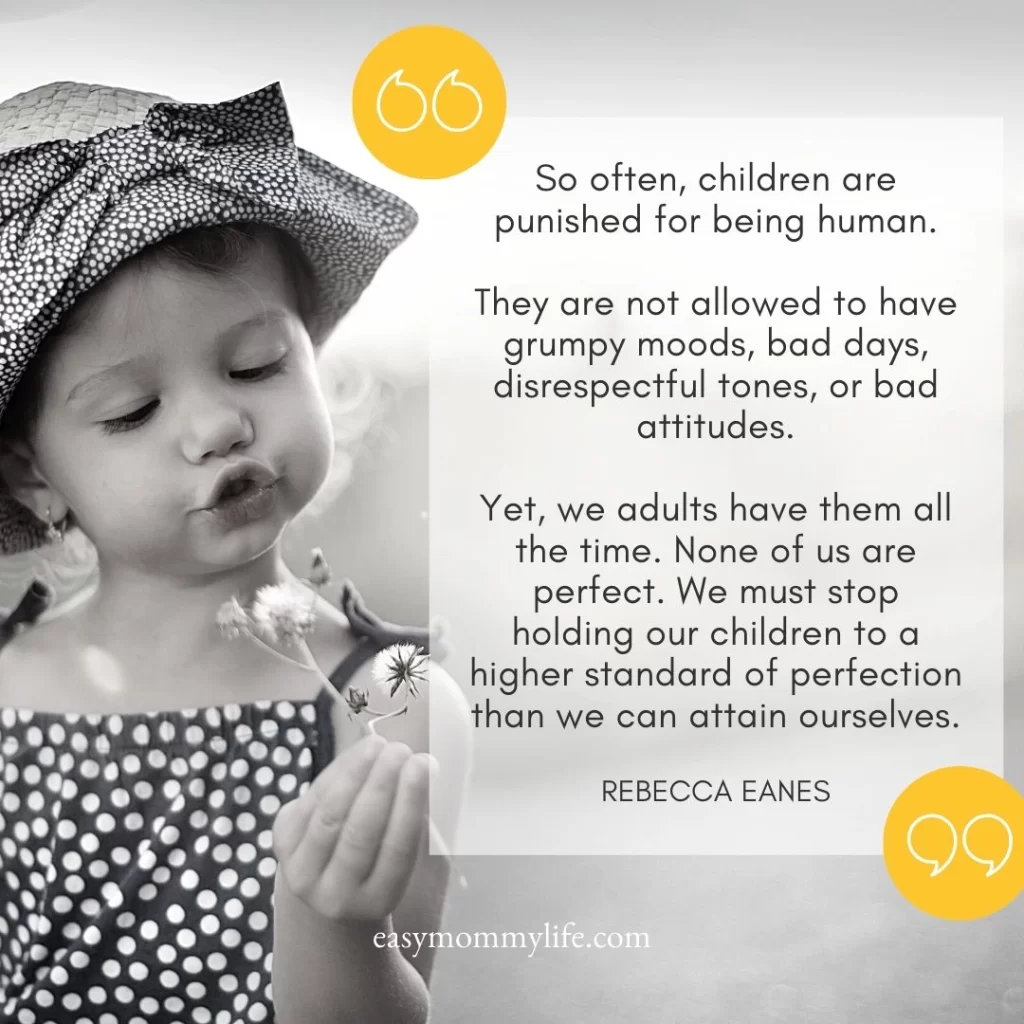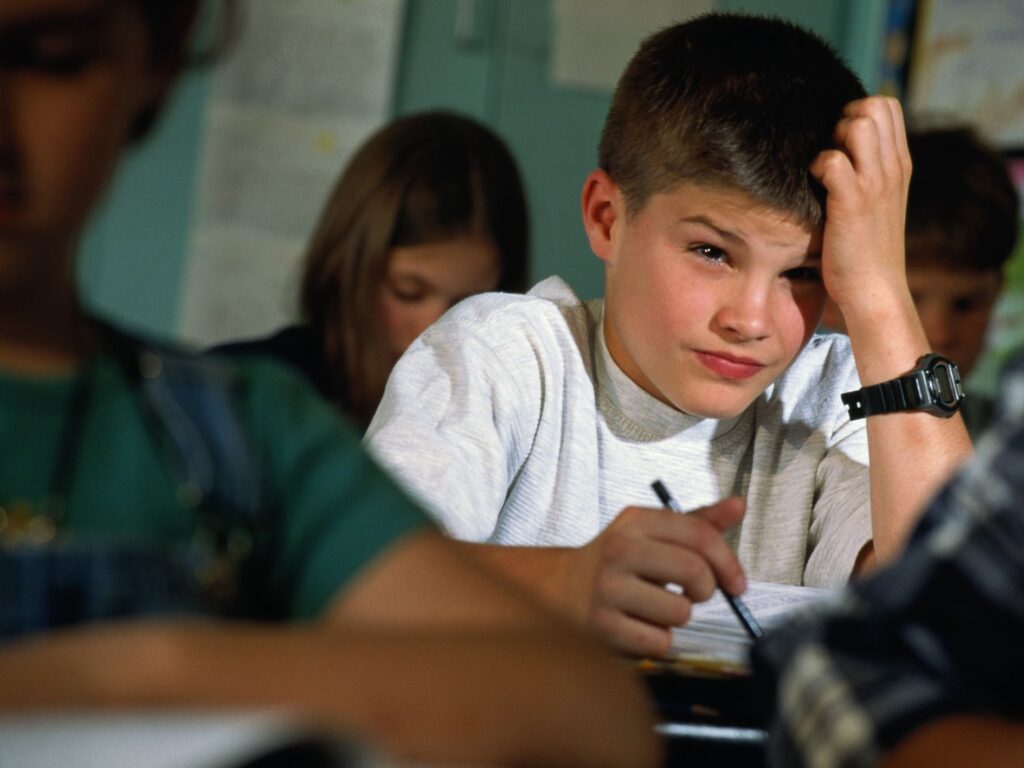Replacing Punishment with Positive Parenting
Positive parenting redefines discipline by shifting away from punishment and harsh consequences toward guiding and leading. Discipline using punishment and harsh consequences can produce some results we don’t want to see – for example, kids who become excessively fearful and anxious or kids who just become sneakier to avoid the punishment.
Next time discipline is needed, try some positive parenting techniques instead. The Gottman Institute put together a 5-step guide for emotion coaching as part of positive parenting:
- Increase your awareness of your child’s emotions by being fully present and tuning in to their facial expressions, body posture, and words.
- Use tough moments as opportunities to connect with your child.
- Really listen with undivided attention to your child describe their experience and then validate their feelings. Remember, you are validating feelings, and not necessarily their behaviors. We can validate without agreeing!
- Help your child label the emotions they are experiencing – this helps them make sense of their internal experience and gives them the vocabulary they need to talk about emotions.
- Only now are you ready to problem-solve and set limits. Don’t skip the other steps! And remember that sometimes, all we need is someone to listen and empathize … am I right? Your child may automatically feel better and calmer once they know you understand.
The goal here is to be warm yet firm and to establish your authority without using physical punishment or shame. Although consistency is good, perfection is not attainable, so take one step at a time toward becoming better at this … you’ve got this!


Chores for Children
Wondering about chores for your kids? Are you fighting wars around chores? Is it really worth the effort to include chores in your family’s routine? What does the research say about this topic? Well, research suggests that there are benefits to including chores in a child’s routine as early as age 3!
- Chores can help a child develop higher self-esteem – they can help a child feel a sense of connection, belonging, and importance in the family.
- Chores can help a child develop a sense of responsibility, including time management and organizational skills.
- Chores can provide opportunities for success, teach persistence, and help your child become better equipped to deal with frustration. Chores aren’t always easy, and it will take some practice for your child to learn how to do them, but the sense of accomplishment for a job well done is unmatched!
- Chores definitely provide a good foundation for your child to function independently later in life.
Are you interested in your child becoming more independent and helpful? If you want your child to be able to do a skill, you have to teach him or her what to do. We cannot expect our children to automatically know what to do just from watching us, and they may need our help more than once (or twice or three times!) before being able to do it by themselves. So how do you do this?
- Give directions that tell your child exactly what to do and what the goal is – for example, say “Melissa, go put your plate by the sink” rather than “Where does that go?”
- If your child seems unsure of what is expected, follow your direction with, “Let me show you how to do it” using a gentle tone of voice. Provide the least amount of help your child needs to do it successfully.
- Praise your child enthusiastically, and be specific about what your child did. When your child is first learning a task, it is important to encourage his or her attempts – if you discourage or reprimand your child because he or she didn’t do it quite right, he or she will be less eager to try it again.
October 2-8 is Mental Illness Awareness Week
Did you know it’s Mental Illness Awareness Week?? A lot of people wonder at what point they should become concerned and seek help for their own or someone else’s mental health. The National Alliance on Mental Illness (NAMI) lists these as warning signs of mental illness in adults and adolescents:
- Excessive worrying or fear
- Feeling excessively sad or low
- Confused thinking or problems concentrating and learning
- Extreme mood changes
- Prolonged or strong feelings of irritability or anger
- Avoiding friends and social activities
- Difficulties understanding or relating to other people
- Changes in sleeping habits or feeling tired and low energy
- Changes in eating habits such as increased hunger or lack of appetite
- Difficulty perceiving reality
- Lack of insight into changes in one’s own feelings or behavior
- Overuse of substances (e.g., alcohol or drugs)
- Multiple physical complaints without obvious causes (e.g., headaches, stomachaches, vague aches and pains)
- Thinking about suicide
- Trouble carrying out daily activities or handling daily problems and stress
Symptoms in children may include:
- Changes in school performance
- Excessive worry or anxiety (e.g., fighting to avoid going to bed or school)
- Hyperactive behavior
- Frequent disobedience or aggression
Don’t be afraid to reach out if you or your child needs help. Call for a FREE consultation if you are concerned about your child or adolescent – an evaluation can be helpful in discovering exactly what is going on so you will know how to help and support your child. Getting an accurate diagnosis is a great first step in a treatment plan!

Is Your Child Struggling Academically?
Most every child has difficulties at school from time to time – it’s normal for children to have difficult weeks or months socially or behaviorally, and even bright children find some concepts or classes challenging. So what are the signs that a psychoeducational assessment might be needed?
- Your child struggles greatly and consistently in certain areas despite classroom accommodations and/or additional help being provided
- Your child’s attitude toward school progressively gets worse and worse
- Your child’s behavior in class is persistently disruptive (this might be a learning rather than a behavioral issue!)
So what will this psychoeducational evaluation look like? First, it is important to know that a private evaluation will look a lot different from a school-based evaluation. In Florida, school-based evaluations focus a lot on the progress monitoring data that is collected during intervention sessions. As a private evaluator, I will still be interested in this data, but the scope of my evaluation will be much broader. The goal of my evaluation is to carefully define your child’s unique abilities and learning challenges and use this information to develop specific recommendations aimed to help teachers at school know which interventions are likely to be most successful and to help you know how you can support your child at home and be a good advocate for them at school.
Here’s what the process looks like with me at Monarch:
- An initial interview with you as the parent to discuss current issues and review background information
- A one-on-one testing session with your child to assess academic skills, intellectual ability, and the neurocognitive skills that are the foundation for learning to read, write, and do math.
- A screening of social-emotional and behavioral functioning using interviews and questionnaires
- Additional testing as necessary to explore an area that testing may have brought to light
- Report and recommendations: I write a comprehensive report that explains the findings and makes recommendations that are individualized for your child and family situation
- A feedback session with you as parents to share results
- A feedback session with your child can also be arranged to help explain results to them in a developmentally appropriate way
Still not sure if this might be helpful for your child? Or ready to get the process started? Call me for a FREE consultation so I can hear about your situation and answer your questions so you can make an informed decision. I can’t wait to meet you!